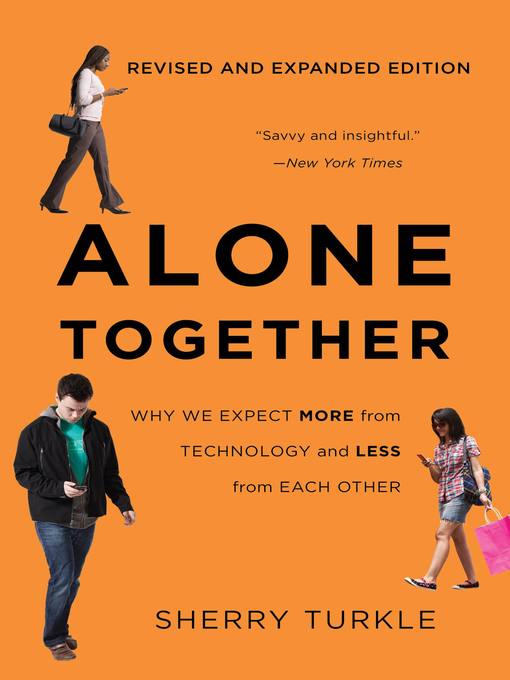
Alone Together
Why We Expect More from Technology and Less from Each Other
- اطلاعات
- نقد و بررسی
- دیدگاه کاربران
نقد و بررسی

Starred review from November 15, 2010
As the digital age sparks increasing debate about what new technologies and increased connectivity are doing to our brains, comes this chilling examination of what our iPods and iPads are doing to our relationships from MIT professor Turkle (Simulation and Its Discontents). In this third in a trilogy that explores the relationship between humans and technology, Turkle argues that people are increasingly functioning without face-to-face contact. For all the talk of convenience and connection derived from texting, e-mailing, and social networking, Turkle reaffirms that what humans still instinctively need is each other, and she encounters dissatisfaction and alienation among users: teenagers whose identities are shaped not by self-exploration but by how they are perceived by the online collective, mothers who feel texting makes communicating with their children more frequent yet less substantive, Facebook users who feel shallow status updates devalue the true intimacies of friendships. Turkle 's prescient book makes a strong case that what was meant to be a way to facilitate communications has pushed people closer to their machines and further away from each other.

February 15, 2011
Clinical psychologist--and sociologist of the Internet--Turkle (social studies of science & technology, MIT; Simulation and Its Discontents) presents a cautionary tale about what she calls the "robotic moment," i.e., our current state of technological connection and societal disconnection that makes us willing to consider robots for true companionship. She tells two stories--of her research observing people with interactive but still rudimentary machines like Furbies and Paros and her experiences interviewing people (including many adolescents) about their digital habits and tools (e.g., texting, IM'ing, and Facebook). Although she tries to conclude on an up note, insisting we still have time to think carefully about how we use computers and connect to one another in an always-connected world, her tales of seniors ready to accept robot companions and kids seeking attention from parents addicted to their own Blackberries make for sobering reading. VERDICT Turkle's findings are engaging and her conclusions thoughtful (she's been called "Margaret Mead in cyberspace"). Her book is best for serious readers because those seeking livelier popular science writing might find her style here a bit dry.--Sarah Statz Cords, The Reader's Advisor Online, Middleton, WI
Copyright 2011 Library Journal, LLC Used with permission.

November 1, 2010
A clinical psychologist takes a critical and sometimes disturbing look at the psycho-social dangers of mixing technology and human intimacy.
Turkle (Social Studies of Science and Technology/MIT; Simulation and Its Discontents, 2009, etc.) paints a bleak picture of a robotically enhanced future in which humans become increasingly emotionally dependent on technology. As this dependency on technology for meaningful social interaction increases, writes the author, the more humans will lose their ability to have authentic and meaningful relationships with one another. Turkle begins her study with possibly the creepiest findings from her fieldwork: the ongoing development and acceptance of "sex robots," and the zeal of the scientific community's crackpots who'd like to exalt robots to equal relational status with human beings. Essentially this means programming robots as not only a sexual supplement to humans' sex lives but also as an actual surrogate for an intimate bedfellow. From there, the author's examples of a society gone technologically wild can only seem tame: children getting robotic pets and cell phones before they hit puberty; insecure teens seeking a new self through avatars and virtual-reality games; young Facebookers afraid of the permanency and nakedness of their information on the Internet. Turkle advances the notion that Internet-based social networking and communication via texting and e-mail can only lead to alienation and awkwardness when facing inevitable person-to-person confrontations. But the author is careful not to blame technology and its handlers for corrupting the easily corruptible. Many of the technological slaves that Turkle profiles are—one hopes—exceptional examples. The author seems confident that human instinct will eventually intervene and prompt us into evasive action as soon as technology begins to increasingly dominate our lives. This cautious optimism is admirable, but it can't quite brighten the dystopic pallor the book ultimately casts on the future of human relationships.
Despite the dry, clinical writing, Turkle provides potentially valuable social research.
(COPYRIGHT (2010) KIRKUS REVIEWS/NIELSEN BUSINESS MEDIA, INC. ALL RIGHTS RESERVED.)

January 1, 2011
With the recent explosion of increasingly sophisticated cell-phone technology and social networking websites like Twitter and Facebook, a casual observer might understandably conclude that human relationships are blossoming like never before. But according to MIT science professor Turkle, that assumption would be sadly wrong. In the third and final volume of a trilogy dissecting the interface between humans and technology, Turkle suggests that we seem determined to give human qualities to objects and content to treat each other as things. In her university-sponsored studies surveying everything from text-message usage among teens to the use of robotic baby seals in nursing homes for companionship, Turkle paints a sobering and paradoxical portrait of human disconnectedness in the face of expanding virtual connections in cell-phone, intelligent machine, and Internet usage. Despite her reliance on research observations, Turkle emphasizes personal stories from computer gadgetrys front lines, which keeps her prose engaging and her message to the human speciesto restrain ourselves from becoming technologys willing slaves instead of its guiding mastersloud and clear.(Reprinted with permission of Booklist, copyright 2011, American Library Association.)




دیدگاه کاربران